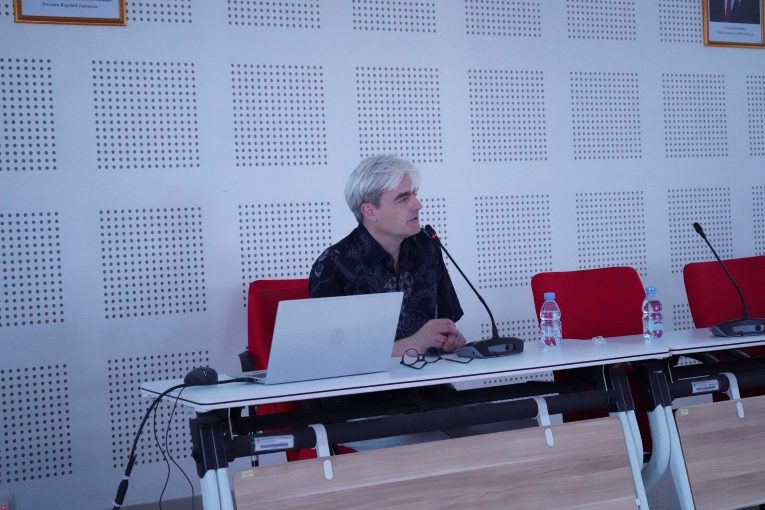
Yogyakarta, 10/7/2025 – The Department of History at the Faculty of Cultural Sciences, Universitas Gadjah Mada (UGM), recently held a public lecture aimed at igniting intellectual enthusiasm and fostering critical interdisciplinary discussions. The event, titled “Decolonizing Photography Archives: Research Issues in the Colonial Era and Its Visual Documentation,” took place in Room 709 of the Soegondo Building and featured Dr. Martin Slama, a senior researcher from the Austrian Academy of Sciences, as the keynote speaker.
In his presentation, Dr. Slama unveiled the findings from the 1928-1929 expeditions conducted by Austrian and German scientists to the Dutch East Indies. This limnological expedition not only produced around 3,000 photographs highlighting the ecology of rivers and lakes but also meticulously documented the lives of local communities, capturing everything from traditional ceremonies and religious activities to daily routines. Notably, many of the images were taken using stereo photography technology, which provided a three-dimensional effect.
However, despite their significant scientific value, these photographic archives have remained exclusively stored in Vienna, Austria. The limited access to these images has been a central critique raised during the discussion: how can these photographs be recontextualized for the communities from which they were taken? How can they be transformed from mere colonial heritage into a window for social, cultural, and historical reflection?
Dr. Slama emphasized that mere digitization is not enough. He argued that a decolonization approach is necessary in presenting these digital archives, allowing local communities in Indonesia to access, understand, and reinterpret the images in today’s context. “These colonial photographs must be given new life, not just as visual objects, but as part of a narrative that involves the communities that were once their subjects,” he stated.
The discussion was dynamic and filled with enthusiasm. Faculty members, students, and academics from various fields actively engaged in questioning and dialogue, demonstrating the importance of the intersection between history, visuality, and archival ethics in post-colonial studies.
Through this public lecture, the Department of History at UGM not only opened an academic space for learning about the past but also challenged participants to think critically about the present and how colonial legacies can be reconstructed for a more just and inclusive future. The event highlighted the role of education in addressing historical injustices and fostering a deeper understanding of cultural heritage.
As the conversation unfolded, it became clear that the decolonization of photographic archives is not merely an academic exercise but a vital step towards reconciliation and empowerment for the communities depicted in these images. By engaging with these archives, participants were encouraged to reflect on their own identities and histories, fostering a sense of ownership over their cultural narratives.
In conclusion, the public lecture served as a reminder of the power of education in shaping societal perspectives and the importance of reexamining historical narratives. The collaboration between scholars and local communities is essential in ensuring that the legacies of the past are not forgotten but are instead transformed into tools for education and social justice.

